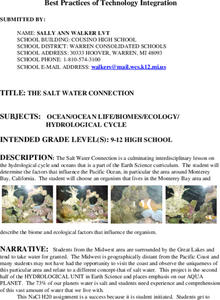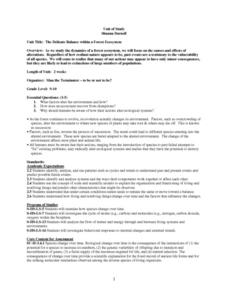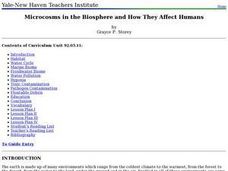Smithsonian Institution
Water/Ways: The Poetry of Science
Water is the source of life. It appears in poetry in both peaceful and torrential descriptions; it appears in earth science in its liquid, gaseous, and solid states. Combine these interpretations of our planet's most precious and...
Curated OER
Go To The Head of the Cloud
Students pretend they are water droplets traveling through the water cycle. Using their text, they discover the steps in the cycle and the different paths water can take. They write a report about their journey through the water cycle...
Curated OER
Biosphere II
Students continue their examination of the existence of life on Earth. In groups, they determine the role of the water cycle and other biogeochemical cycles play in keeping balance on Earth. They participate in experiments to discover...
NOAA
I Can't Breathe!
The Gulf of Mexico dead zone, an area of low oxygen that kills marine life, costs the United States $82 million every year. Young scientists research anoxic ocean environments then come up with a hypothesis for the cause of the Gulf of...
Curated OER
Cycles of Life in an Urban Habitat: Changes in Biodiversity
Second graders compare and contrast animate and inanimate objects. In this environmental science lesson, 2nd graders create simple food webs. They observe their environment and create a collage about it.
Curated OER
The Seasonal Cycle
Students complete a unit of lessons on the four seasons. They examine the effect each season has on plants, animals, and people during the actual season, read magazine and newspaper articles, and create a calendar and poster about each...
Curated OER
Extensions - Biology Review Unit
Learners engage in a variety of activities in order to review a Biology unit. For example, they research the Bird Flu, it's history, how it is spread, what has been done about it, what better options exist for controlling or removing it....
NOAA
The Dead Zone
The fifth installment of a 23-part NOAA Enrichment in Marine sciences and Oceanography (NEMO) program defines dead zones and how they form. Pupils then examine data from the Gulf of Mexico to determine dead zone formation.
Sea World
Ocean Discovery
Immerse your young marine biologists in the world of marine animals. The lesson includes several activities that are age-appropriate for preschoolers and kindergartners, including coloring pages, gluing feathers and sand onto paper...
Chicago Botanic Garden
Introducing Ecosystem Services
Purifying air and water, providing soil in which to grow crops, and moving water through its natural cycle are all services an ecosystem provides that benefit humans. Lesson four in a series lets learners explore and discuss the value of...
Curated OER
Perplexing Polka Dots
Tell case study story of EMS-induced chlorophyll polka-dots in C-ferns. You will need to be familiar with the experiment, as there are some slides that have only photos, no text and no presenter's notes. By using this presentation,...
Sea World
Marine Animal Husbandry and Training
Step into the role of a zoo director with several activities about animal training and running a zoo. Kids calculate the amount of food each animal needs, design a habitat for penguins, decide how to breed bottlenose dolphins, and train...
Science Matters
Ecosystem Pre-Assessment
Test scholars' knowledge of ecosystems with a 20-question pre-assessment. Assessment challenges learners to answer multiple choice questions, read diagrams, and complete charts.
Curated OER
Water Is Cool!
Students study water as a non-renewable resource. In this water lesson, students examine sources of water, uses of water, and explain why it is important to take care of water sources for the common good. They research the water cycle...
Curated OER
The Very Hungry Caterpillar
Second graders watch a video about Eric Carle before listening to his story entitled, The Very Hungry Caterpillar. They notice how the caterpillar eats its way through the days of the week and they examine the life cycle of the...
Curated OER
The Salt Water Connection
High schoolers explore the hydrological cycle and oceans. They determine the factors that influence the Pacific Ocean. Students research an organism found in Monterey Bay. They describe the organism's biome and ecological factors that...
Curated OER
Air and Water in the Environment
Second graders participate in a three part lesson plan in which they identify and describe forms of moisture in the environment. Part one of the lesson plan involves the three stages of the water cycle, part two focuses on creating...
Curated OER
Biome-Ecology Unit with a "Design a Zoo" Extension
Young scholars participate in a three part unit about biomes. Part one, students research the biomes of North America and part two consists of research on zoos and a field trip to a zoo. While part three ties together the first two...
Curated OER
The Delicate Balance within a Forest Ecosystem
Students examine the causes and effects of alterations in a forest ecosystem and evaluate how human actions may only seem to have minor consequences, but can lead to extinctions of large numbers of populations. Students produce an...
BBC
Ourselves
Young biologists identify parts of the body, sort humans from other animals, and list the difference they see. Learners are split up into groups of three, and each group must find pictures in magazines of humans and other animals. They...
Curated OER
Models of Succession
Students create a model city in order to understand the effects human habitats have on the environment. In this environment lesson, students examine the effects human habitats have on the environment. Students create a model city and...
National Park Service
Reduce Our Carbon Footprint, Let’s Compost!
Roll up your sleeves and get a little dirty with this elementary and middle school compost lesson. All you need is a large plastic container, a couple old newspapers, some organic waste, and a few hundred worms and you're ready to start...
Curated OER
Science: Microcosms in the Biosphere
In a series of lessons, examine the impact on humans by microcosms in the biosphere. Among the plans structured for young scholars with different abilities and learning styles, are activities describing the symbiotic relationship,...
Curated OER
The Invasion of the Medfly
Students examine the invasion of the fruit fly in California. In groups, they observe and record the fruit fly's lifecycle and how they affect humans in society. They also discuss the history and geography of the fly and the different...

























